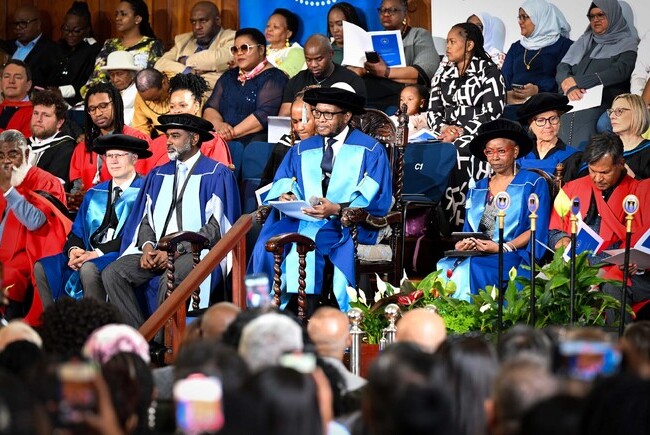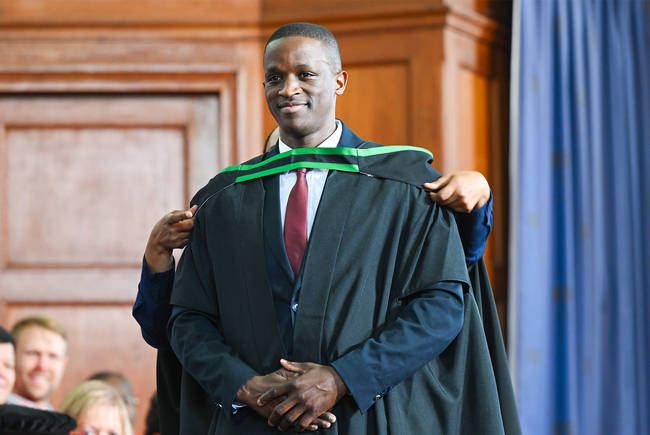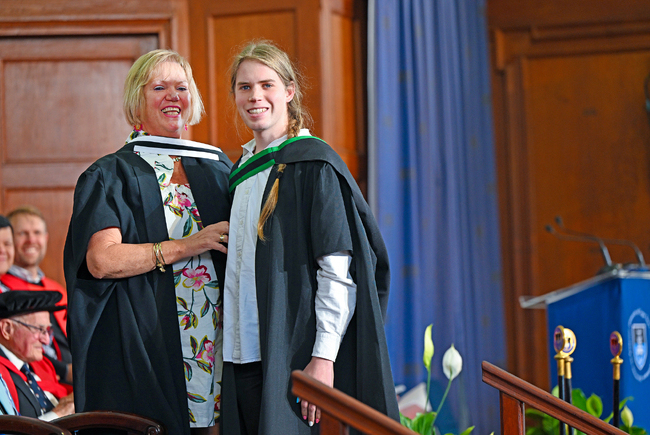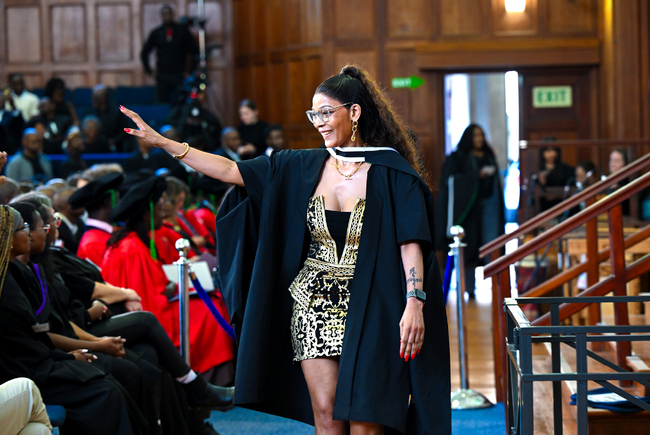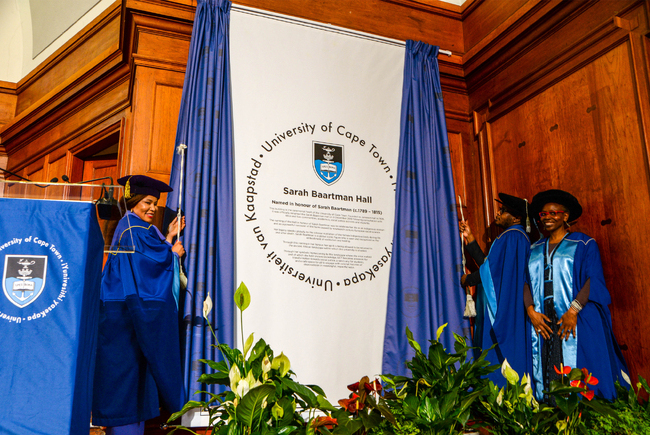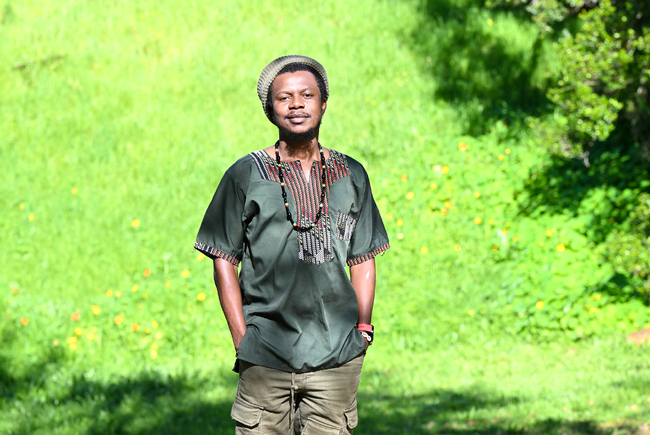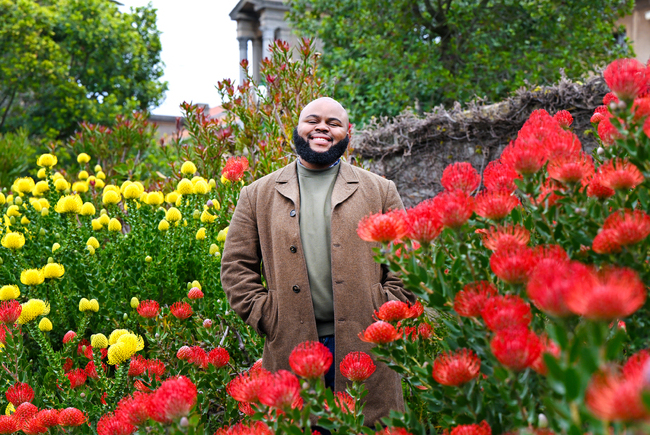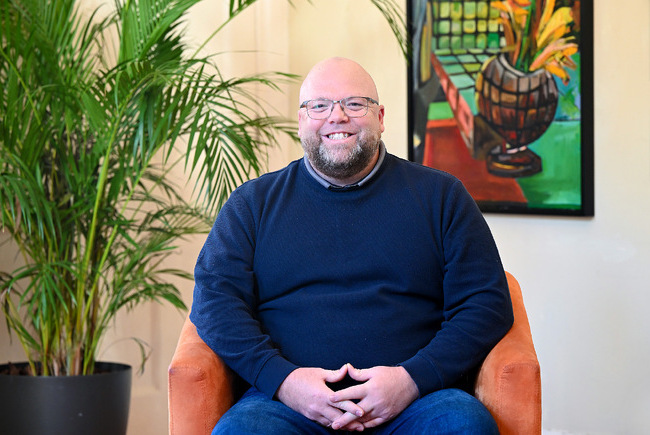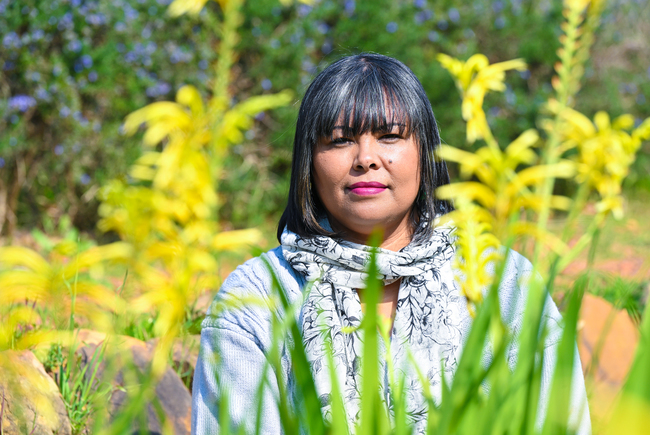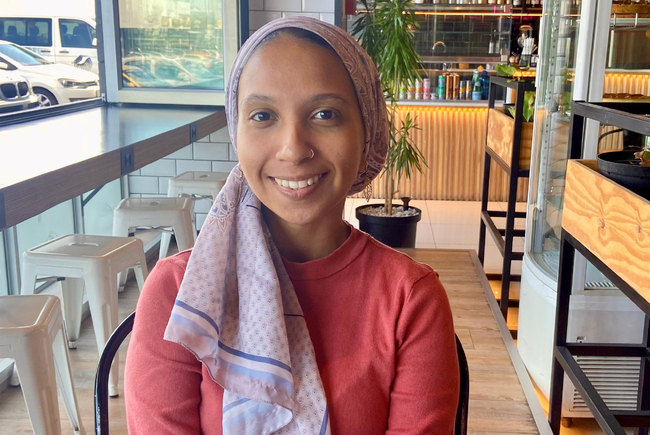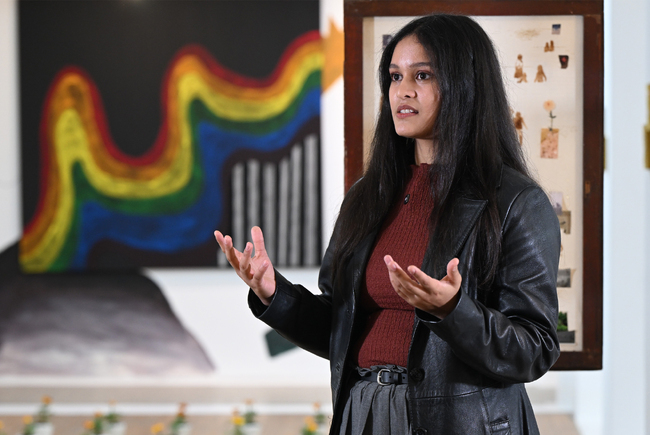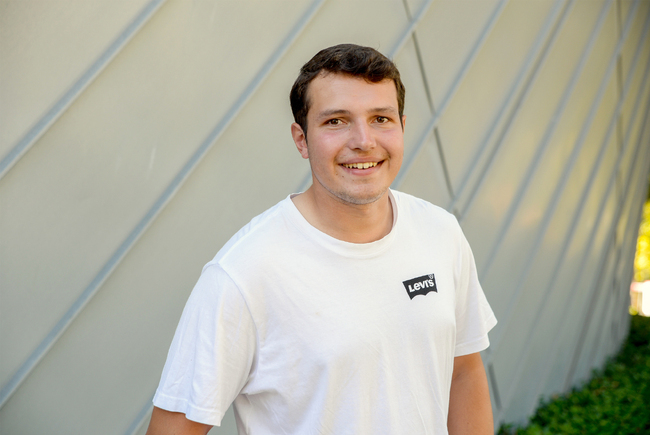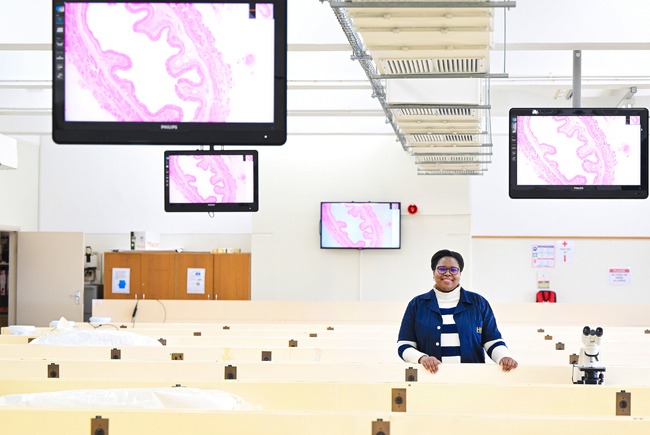Championing socially just and decolonised education
10 September 2025 | Story Myolisi Gophe. Photos Lerato Maduna. Read time 7 min.
For Msakha Mona, the journey to completing his doctoral studies at the University of Cape Town (UCT) has been as much about personal growth as it has been about reshaping education in South Africa and Africa.
A lecturer, performing artist, and advocate for social justice, multilingualism, and decoloniality, the Mpumalanga-born Msakha first arrived at UCT with modest ambitions: to complete an undergraduate degree and embark on a professional career. “I thought I’d come, get the degree, and become a journalist or storyteller,” he recalled. But life, mentorship, and a sense of responsibility to his family and community steered him toward postgraduate studies and an academic career.
Mentors such as Khwezi Bonani, a former deputy warden at Leo Marquard Hall residence; and Daniel Munene, who is the current warden, encouraged him to consider postgraduate opportunities and to aim higher. His family has been a key motivation to Msakha’s pursuit of higher education. “Whenever I shared these ideas with my family, especially my mother, they encouraged me to study further. It would lead to better opportunities,” Msakha said. Their support, combined with his own competitiveness and a desire to set a precedent in his family, solidified his decision to pursue further studies.
Msakha’s academic path included work in UCT administration; being a teaching assistant; a lecturing role at the University of Mpumalanga, which was established in 2014; and finally a permanent lecturer position at UCT from 2022. Alongside his academic work, he is a performing artist in music, theatre, and storytelling, which has informed his approach to knowledge production, dissemination and teaching.
A doctorate in decolonial education
His PhD research, titled “Decolonial approach to a socially just curriculum: A case study of a first-year common course in an emerging post-apartheid university eMzansi Afrika”, focused on the practical application of socially just and decolonised curricula. He conducted his study in the context of African universities, with a particular focus on one established after apartheid, where colonial legacies are less overt but still deeply entrenched. One course he studied, MIC 100, was a common course designed around African philosophies, such as ubuntu, and African humanism. Students were exposed to learning that challenged Eurocentric norms and emphasised African ways of knowing.
“We know that African approaches are real and they work, but here’s a university that had a chance to show us: what does it look like? And it was not done,” he said, reflecting on the missed opportunity to embed decolonial practices more broadly beyond just one course. “If we are serious about providing decolonised, socially just education, we have to dig deep because we’ve built another university that perpetuates the very same coloniality it was meant to address.”

Despite the structural challenges, the common course provided students with new perspectives. Interviews and course reviews conducted between 2019 and 2020 revealed that students had shifted from viewing university primarily as a means to gain employment to seeing it as a space for acquiring knowledge that could positively impact their communities. Many students reported embracing multilingualism and appreciating other cultures through language. For students from marginalised language backgrounds, such as Xitsonga, this approach boosted self-esteem and allowed them to express themselves more fully in the classroom. “If you start teaching students in languages they are familiar with, you open up their ways of learning and affirm them in a world that is often designed against them,” Msakha said.
Expanding horizons through collaboration
A central lesson from his PhD is that contemporary education must reflect on its purpose. In the context of Africa, colonial and apartheid-era education systems were designed to assimilate and devalue black students. Understanding the role of modern universities in countering these legacies is critical to shaping curriculum and teaching practices. “If we understand what a university is meant to do today, we can design courses and policies that truly serve students and communities,” he explained.
Msakha’s research also extended beyond South Africa. He was nominated by UCT to participate in the National Research Foundation’s (NRF) Black Academic Advancement Programme and has engaged in international collaborations such as the Racial Justice Fellowship with the United States (US). He recently spent time at the University of Ghana, where he explored the role of arts in knowledge production and dissemination and investigated the decolonial potential of teaching through the lens of love rather than confrontation. “We don’t always need to think of decolonisation as painfully aggressive fights. What would a decolonial approach centred on love look like?” he asked.
“UCT has changed dramatically, with more black students and staff on campus. Representation of bodies is positive, but epistemic access is still something students need to fight for.”
These international and local projects align with his ongoing work with the Kulani Arts Project, which promotes African cultural expression and arts-based knowledge dissemination. He also serves on UCT’s Language Policy Committee, advocating for translanguaging approaches to foster language justice in education. “I’m looking forward to implementing a socially just approach to language at UCT and seeing how it can transform classrooms,” he said.
Looking ahead
Looking ahead, Msakha aims to continue applying his research practically. He is preparing to teach courses in a manner that challenges Eurocentric norms, using storytelling, poetry, and African languages as mediums for knowledge creation. His involvement in initiatives like the Black Education Research Centre in the US positions him to guide global efforts toward socially just curricula.
Reflecting on UCT itself, Msakha acknowledges both progress and persistent challenges. “UCT has changed dramatically, with more black students and staff on campus. Representation of bodies is positive, but epistemic access is still something students need to fight for,” he said. While demographic changes are evident, the curriculum often remains tied to Eurocentric frameworks. His work seeks to bridge that gap and make higher education more inclusive, relevant, and transformative.
With his PhD now complete, Msakha is energised to apply his scholarship in teaching, policy, and international collaborations. He continues to advocate for education that is socially just, multilingual, and responsive to African realities, bringing together his experience as a lecturer, researcher, and performing artist.
A few days after his graduation, Msakha is scheduled to travel to Cape Verde Island for his first conference as Dr Mona. He is set to present his work, titled “The possibilities of decolonial education in building hope for the future of Afrika”, at the 6th Biennial Conference of the African Studies Association of Africa.
“Decolonising knowledge is not just cosmetic,” he emphasised. “It requires acknowledging diverse ways of knowing and engaging with students’ lived experiences. That is the legacy I hope to leave in my classrooms, in my policy work, and in the broader academic landscape.”
 This work is licensed under a Creative Commons Attribution-NoDerivatives 4.0 International License.
This work is licensed under a Creative Commons Attribution-NoDerivatives 4.0 International License.
Please view the republishing articles page for more information.
Spring 2025 Graduation

The University of Cape Town (UCT) hosted graduation ceremonies from Monday, 8 September until Wednesday, 10 September 2025. The ceremonies were livestreamed on the website and UCT’s Facebook page (recommended for mobile devices like cell phones and tablets), and the video recordings will be available on this feature page and UCT’s YouTube channel as soon as possible after the event.
Graduation news
Graduation news
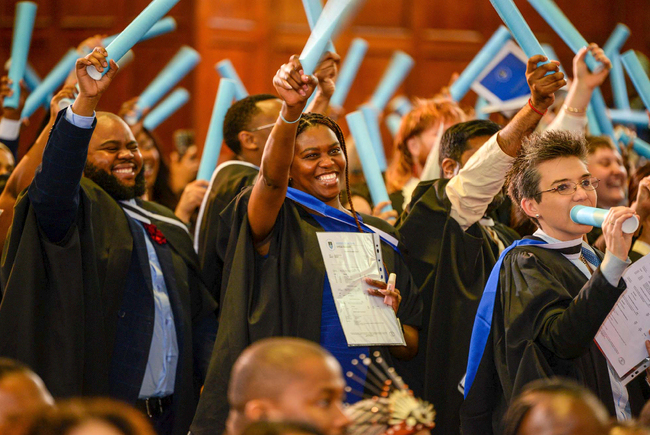
The University of Cape Town’s (UCT) Chancellor Dr Precious Moloi-Motsepe and Vice-Chancellor Professor Mosa Moshabela urged graduates at the spring graduation to use their education to enrich not only their own lives but also their communities, stressing the importance of values such as compassion, respect, and integrity in a volatile world.
25 Sep 2025
The University of Cape Town’s (UCT) spring graduation was marked by historic milestones, including the awarding of honorary doctorates to four distinguished individuals and the official renaming of Jameson Hall to Sarah Baartman Hall, among other notable highlights.
25 Sep 2025Inspirational graduates
Our stories: inspirational graduates
The UCT News team has profiled a cross-section of inspirational graduands whose stories have inspired us. To all those we haven’t been able to feature, we’d like to say: each one of you is an inspiration – to your university, your families and your communities. We wish you every success in the future.
Ceremony recordings
Ceremony recordings
Graduation programmes
The names of all of the spring 2025 qualifiers are listed in the graduation ceremony programmes. Congratulations to everyone who has graduated.
We are excited to see our UCT graduates unleash their potential for a fair and just society. Thank you for joining the celebrations on social media by using the #UCTGrad2025 hashtag.
Social media elements#UCTGrad2025 – social media elements
Customised Facebook and Instagram stickers are available on our social media platforms. Watch the tutorial videos here to see how easily you can get your online presence ready.








